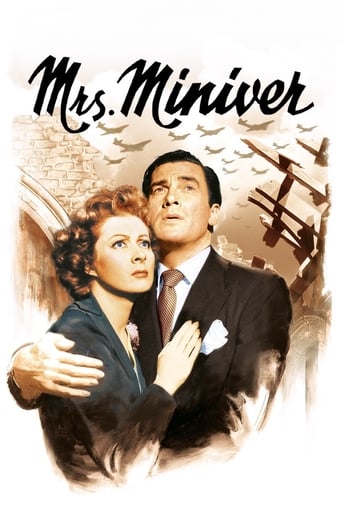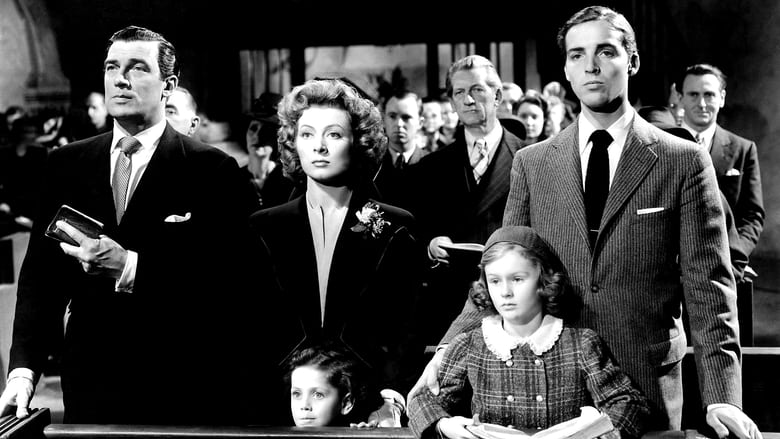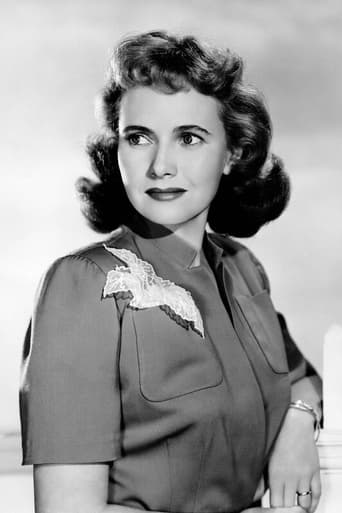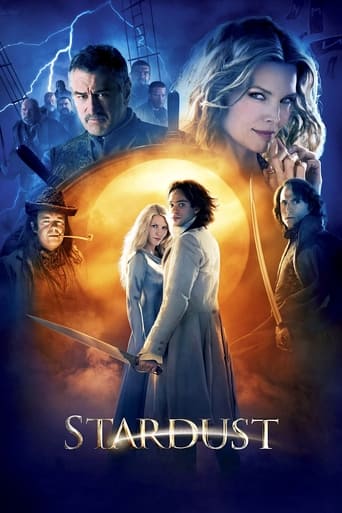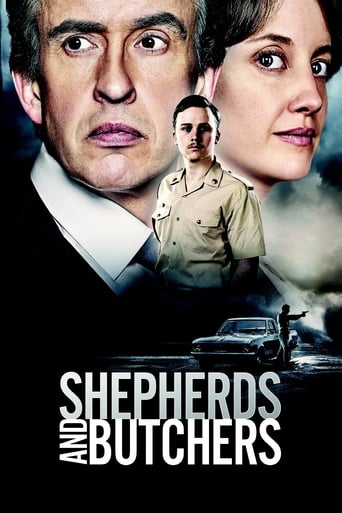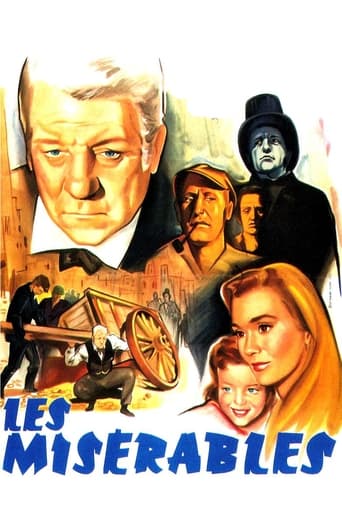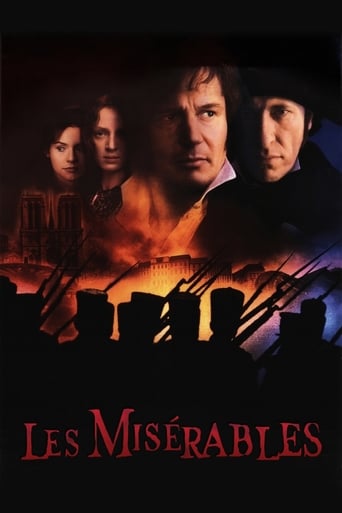Mrs. Miniver (1942)
Middle-class housewife Kay Miniver deals with petty problems. She and her husband Clem watch her Oxford-educated son Vin court Carol Beldon, the charming granddaughter of the local nobility as represented by Lady Beldon. Then the war comes and Vin joins the RAF.
Watch Trailer
Cast


Similar titles
Reviews
I can only imagine the impact this movie must have had on American audiences in 1942--the deep feelings of sympathy it aroused for the British people who were suffering under the incessant Nazi bombings. I'm guessing that it was this movie that made my mother say that her favorite male movie star was Walter Pidgeon (something I could never figure out till I saw "Mrs. Miniver" and realized how much she must have cried seeing it and knowing that my dad would soon be shipped out to England).But in retrospect, the movie needs to be seen also in the context of war-time propaganda and its impact on British and American viewers. The biggest surprise in the movie is surely not that "Lady Beldon" renounces her claim to the village's rose of the year and shows her common cause with "the people". Rather, it was the designation of the Brit who was to be the symbol for all of Britain's war dead. From out of the blue, it turned out to be Lady Beldon's grand- daughter (and a more ethereal, tender and vulnerable creature couldn't have been chosen for the role than Teresa Wright).The obvious choice, and the one everyone in the movie theater must have anticipated, was the Minivers' son as fighter-pilot destined to die in the Battle of Britain (and he almost certainly would have died if he had existed in real life--there were very few fighter pilots who survived from the beginning of war to the end). But the death of a beautiful, young woman, symbol of all the "innocent civilians" to die in the war, surely had a greater impact on the movie-goers. In a sense, it prepared Americans and Brits to understand and accept the logic of Total War, where there are no "innocent civilians".And so it's a strange and sad irony that "Mrs. Miniver" plays a part (a small part, admittedly) in laying the groundwork for the legitimation of the firestorm in Dresden (1945) that killed in a few hours 25,000 Germans, more than half of all the Britons killed over the years of the Nazi bombing of Britain. Just one chapter in the story of the war-time bombing of civilians in the 20th century and beyond.
Mrs Miniver may not be a "flawless" film(then again few films are), character development is somewhat sketchy- though you still care a great deal for the characters- and some of the accents don't convince with Teresa Wright trying too hard and Walter Pidgeon not seeming to attempt one. But when everything else and the film on the whole is as superb as it is they can be seen as trivial and can be easily be overlooked. Mrs Miniver mayn't connect for some by today's standards as much as the other Best Picture nominees that year(Yankee Doodle Dandy for instance still has a lot of appeal) but it's the most important one especially thematically and it certainly connected with me. It won 6 Oscars and was nominated for another 6, all richly deserved, though if more than one winner was allowed in a category May Witty deserved to win her Supporting Actress Oscar. It's a beautiful-looking film with some very hauntingly deliberate shots, and there is a very good soundtrack complete with a sensitive yet sweeping music score and a great use of period favourites. The special effects are great for their time and stand up well today too, while the sound effects have a harrowing effect, the explosions and such almost deafening, how turbulent this particular period was in history is believably done. Mrs Miniver also has a thoughtful script that has emotion and tension(often done subtly, like in the body language), and a story that has a message and theme that still resonates- if perhaps not as relevant- and despite it being a melodrama never feels overwrought. The whole film is genuinely powerful and touching and is helped by the remarkably nuanced pacing, just see what is done with the scene when the husband is seen off to war by his wife. William Wyler directed several great films, a lot of them as much as masterpieces or as close as, and his direction here is tight while alive to nuances. And the acting is one of the film's best assets, with the beautiful Greer Garson outstanding in perhaps a career-best performance, Teresa Wright luminous and like a bright light in a dire situation, May Witty does imperious brilliantly, Walter Pidgeon's understated performance is among his best and Henry Travers is really charming. All in all, Mrs Miniver may not be as such a flawless film but it is a superb one that was worthy of its Best Picture win and is much more than a propaganda piece. 9.5/10 Bethany Cox
Why do so many younger viewers, or stubborn older ones for that matter, avoid a 1940s movie because they perceive it as "old-timey"? This classic film from director William Wyler -- who was to later film "The Best Years of Our Lives" -- makes one laugh, cry and understand the effect of war (timeless war) on so many lives while entertaining the viewer with such ease. Anyone who is not touched by such a film has no business calling himself/herself a film fan. Walter Pidgeon and Greer Garson show why they were such popular stars of their day, and Teresa Wright's performance is magnificent while also familiar to those who know her work. Dame May Witty shows her versatility in a key role of this story concerning class differences in the face of a world war. Look for other familiar faces such as Henry Travers, Henry Wilcoxon, and Reginald Owen, and after viewing check through references to see the the off-screen connection between Garson and the actor who plays her son, Richard Ney.
Nicely done story of an English family during the blitz in 1940-41. Before the war, we are introduced to Mrs. Miniver (Garson), matriarch of a warm, happy middle-class family straight out of "Father Knows Best" except that in this case it's usually Mother who knows best. She and her architect husband (Pigeon) have three children, two small and cute, one grown up and just out of Oxford. He's smart but he's a callow youth. (All youths are callow.) The kid sounds like a fatuous Marxist at the dinner table, but a pretty guest (Wright) soon brings him down to earth.Theresa Wright is a member of the Beldon family. They're aristocrats, not middle-class like the Minivers. There is also a working class in the village, shopkeepers, postmen, and people of that ilk, and the Minivers enjoy friendly relations with all of them. But Lady Beldon (Whitty), the Aristocrat-in-Chief, holds them all in contempt. However, the aristocratic Wright and the non-U Miniver son from Oxford fall in love and -- Well, I could go on with this, but not without sounding like a sociologist.What it is, is a kind of training film for civilians during war time. Mrs. Miniver is a resolute, brave, uncomplaining, church-going, stiff-upper-lip model of civilian endurance. Not just for the Brits who, by the time of this release, had already learned any lessons to be derived from suffering, but for Americans too. The movie was released in 1942 and shot in 1941, when Europe had been at war for years and everyone knew that the war was just around the corner for Americans. So, while the Army recruits were getting movies showing them how to avoid venereal disease, the civilian audiences got movies like this, demonstrating how to avoid breaking down under stress.It's filled with stereotypes but well done for what it is. I'll give an example of a well-written scene. It's the blitz. The Miniver family is huddled down in its bomb shelter in the back yard of the mansion they live in. They're subject to Nazi bombs that scare hell out of them and bash in their dining room.Here's how a perfunctory script would handle the scene. The sirens wail. The family rushes to the shelter. Suddenly -- overhead -- the roar of airplane engines. Anti-aircraft batteries bark at the enemy. A salvo of bombs blasts the shelter as the brave but terrified Minivers huddle together and silently pray. The bombs stop as abruptly as they began. The Minivers emerge from the shelter and stare, stricken, at their smoking, half-ruined manse.Not here. The scene opens with the family already in the shelter, looking out the door while a city on the horizon is aglow with searchlights probing the sky and fitful bursts of anti-aircraft shells. "Not many bombs," observes Pigeon. And we think, "Whew, at least the Minivers aren't getting slammed." Back into the shelter, where they read "Alice in Wonderland" to their dozing children. Then, from nearby, the loud KRUPP of batteries going into action. Then the sound of airplanes. The Minivers sit silently, Garson knitting calmly, Pigeon staring at the walls. Nobody says anything about having loose bowels or needing a jolt of whiskey. The whistle of the first bomb at a distance. Then another, closer. Then a veritable rain of bombs knocking everything over in the shelter. Fade out.A scene at the railway station follows. The Oxfordian is in the RAF and has just returned from his honeymoon with Wright. After an effusive greeting, Pigeon says, "Well -- I'll show you to your room." And they walk up the path into the house, and for the first time we see that half the house seems to have been dismantled by the bombs -- windows broken, daylight showing through the roof, furniture reduced to kindling.I've spent that much time on one scene because the scene illustrates the care with which the script was put together. A more reckless approach would have had the whole business over with in five minutes. Instead, the terror and ultimate shock are allowed to creep up on us, bit by bit, as the threat grows nearer and the aftermath of its impact delayed. Good job.Helmut Dantine is a surprise as a downed and desperate German pilot. For one thing, he's handsome instead of ugly. For another, he shows weakness from his wound and when he collapses in pain, we almost feel sympathy. I only wish he hadn't had to eat like an animal and bark out order like, "Give -- me -- coat." He should be stalwart. Instead, he acts and sounds like Frankenstein's monster.

